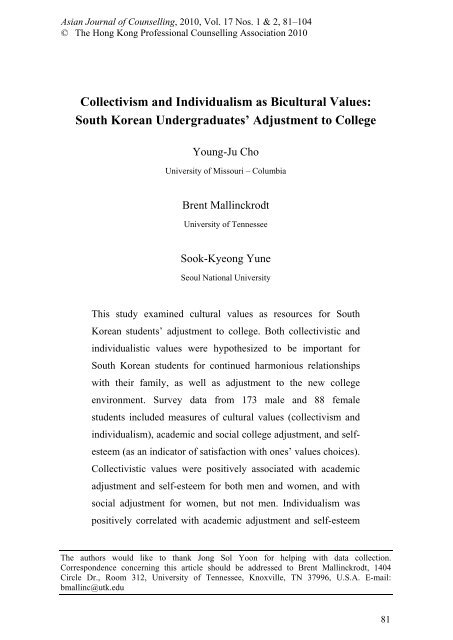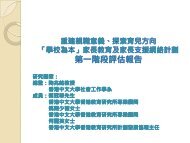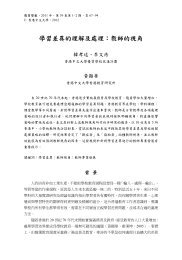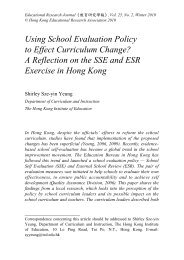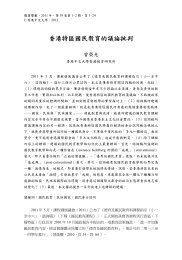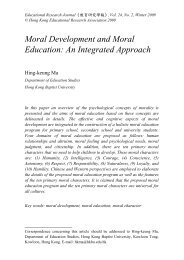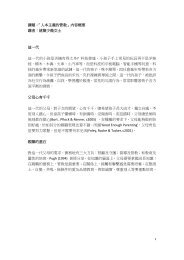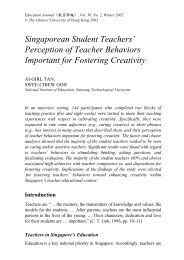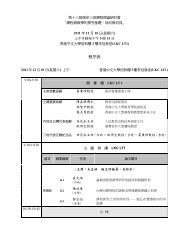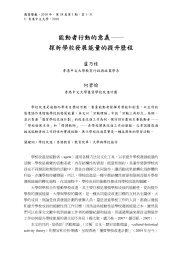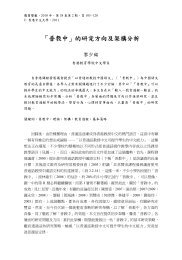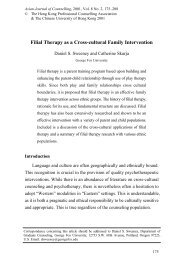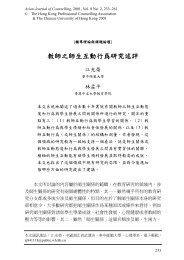Collectivism and Individualism as Bicultural Values ... - Bad Request
Collectivism and Individualism as Bicultural Values ... - Bad Request
Collectivism and Individualism as Bicultural Values ... - Bad Request
Create successful ePaper yourself
Turn your PDF publications into a flip-book with our unique Google optimized e-Paper software.
Asian Journal of Counselling, 2010, Vol. 17 Nos. 1 & 2, 81–104<br />
© The Hong Kong Professional Counselling Association 2010<br />
<strong>Collectivism</strong> <strong>and</strong> <strong>Individualism</strong> <strong>as</strong> <strong>Bicultural</strong> <strong>Values</strong>:<br />
South Korean Undergraduates’ Adjustment to College<br />
Young-Ju Cho<br />
University of Missouri – Columbia<br />
Brent Mallinckrodt<br />
University of Tennessee<br />
Sook-Kyeong Yune<br />
Seoul National University<br />
This study examined cultural values <strong>as</strong> resources for South<br />
Korean students’ adjustment to college. Both collectivistic <strong>and</strong><br />
individualistic values were hypothesized to be important for<br />
South Korean students for continued harmonious relationships<br />
with their family, <strong>as</strong> well <strong>as</strong> adjustment to the new college<br />
environment. Survey data from 173 male <strong>and</strong> 88 female<br />
students included me<strong>as</strong>ures of cultural values (collectivism <strong>and</strong><br />
individualism), academic <strong>and</strong> social college adjustment, <strong>and</strong> self-<br />
esteem (<strong>as</strong> an indicator of satisfaction with ones’ values choices).<br />
Collectivistic values were positively <strong>as</strong>sociated with academic<br />
adjustment <strong>and</strong> self-esteem for both men <strong>and</strong> women, <strong>and</strong> with<br />
social adjustment for women, but not men. <strong>Individualism</strong> w<strong>as</strong><br />
positively correlated with academic adjustment <strong>and</strong> self-esteem<br />
The authors would like to thank Jong Sol Yoon for helping with data collection.<br />
Correspondence concerning this article should be addressed to Brent Mallinckrodt, 1404<br />
Circle Dr., Room 312, University of Tennessee, Knoxville, TN 37996, U.S.A. E-mail:<br />
bmallinc@utk.edu<br />
81
Young-Ju Cho, Brent Mallinckrodt, & Sook-Kyeong Yune<br />
for men, but not women. Multiple regression analyses suggested<br />
the bicultural values hypothesis w<strong>as</strong> not supported for women,<br />
<strong>and</strong> supported for men with regard to positive self-esteem.<br />
Adopting a mixture of individualistic <strong>and</strong> collectivistic values is<br />
discussed <strong>as</strong> part of a larger process of acquiring bicultural<br />
competence that may be necessary for success in incre<strong>as</strong>ingly<br />
Western-oriented Korean universities.<br />
The dimension of individualism–collectivism is one of the most<br />
salient differences between Western <strong>and</strong> non-Western cultures (Markus<br />
& Kitayama, 1991; Singelis, 1994). For example, Hofstede (2001)<br />
reported that South Korea ranked 43rd in individualism, where<strong>as</strong> the<br />
U.S. w<strong>as</strong> the most individualistic of the 50 countries <strong>and</strong> 3 regions<br />
examined. Individualistic cultural values emph<strong>as</strong>ize self-reliance,<br />
autonomy, competition, personal control, <strong>and</strong> individual goals. Behavior<br />
is governed primarily by personal calculations of gain <strong>and</strong> loss. In<br />
contr<strong>as</strong>t, collectivistic cultural values emph<strong>as</strong>ize filial devotion, harmony,<br />
sociability, <strong>and</strong> a willingness to put <strong>as</strong>ide personal needs for the good of<br />
one’s social group. The self is considered to be an <strong>as</strong>pect of a shared<br />
group identity. Behavior is governed primarily by a sense of social norms<br />
<strong>and</strong> obligations (Markus & Kitayama, 1991; Tri<strong>and</strong>is & Gelf<strong>and</strong>, 1998).<br />
Neither individualistic nor collectivistic values should be considered<br />
inherently superior, but rather each is the best functional adaptation to a<br />
given set of cultural circumstances (Tri<strong>and</strong>is & Gelf<strong>and</strong>, 1998). Tri<strong>and</strong>is<br />
<strong>and</strong> his colleagues observed that collectivistic values tend to develop in<br />
cultures with resource scarcity, large families, <strong>and</strong> an economy b<strong>as</strong>ed on<br />
types of agriculture that require cooperation; where<strong>as</strong> individualistic<br />
values tend to develop in affluent cultures with high social <strong>and</strong> geographic<br />
mobility, cultural complexity, urban population centers, exposure to<br />
modern m<strong>as</strong>s media, <strong>and</strong> economies structured to favor individual<br />
farmers, artisans, <strong>and</strong> wage laborers (Tri<strong>and</strong>is et al., 1993).<br />
82
<strong>Collectivism</strong>–<strong>Individualism</strong> <strong>and</strong> College Adjustment<br />
In South Korea, perhaps due to its relative ethnic homogeneity,<br />
a distinct collectivism h<strong>as</strong> evolved, distinguished from the collectivism<br />
in other Asian countries (K<strong>as</strong>hima et al., 1995; Rhee, Uleman, & Lee,<br />
1996). Behavior is constrained by implicit shared norms in South Korea.<br />
The importance of emotional relatedness can be found in the emph<strong>as</strong>is<br />
on cheong (emotional connection) <strong>and</strong> woori (sense of “we”) in<br />
interpersonal relationships. Koreans tend to strongly identify with an<br />
in-group (Na & Min, 1998) <strong>and</strong> develop woori toward this group, <strong>as</strong><br />
well <strong>as</strong> a sense of out-groups <strong>as</strong> “others” who are clearly distinguished.<br />
Strong emotional bonds <strong>and</strong> relatedness through networks of extended<br />
family relationships incre<strong>as</strong>e in-group identification.<br />
Although by tradition the culture of South Korea h<strong>as</strong> been quite<br />
collectivistic, <strong>and</strong> many citizens hold quite f<strong>as</strong>t to these values, some<br />
segments of society have recently experienced strong pressures to adopt<br />
more individualistic cultural values (Y.-S. Park & Kim, 2006). In spite<br />
of the changes of values in Korean society, few empirical studies have<br />
explored the collectivism <strong>and</strong> individualism of Korean. G. Han <strong>and</strong> Shin<br />
(1999) surveyed adults working at large companies across South Korea<br />
<strong>and</strong> reported that 51% could be cl<strong>as</strong>sified <strong>as</strong> having individualistic<br />
cultural values. Observers note that beginning more than two decades<br />
ago, Korean society h<strong>as</strong> become incre<strong>as</strong>ingly Westernized <strong>and</strong><br />
individualized in the economic, social, <strong>and</strong> political spheres, with<br />
incre<strong>as</strong>ing emph<strong>as</strong>is on individual freedom <strong>and</strong> rights (G. Han & Shin,<br />
1999). The importance of extended family or clan h<strong>as</strong> decre<strong>as</strong>ed.<br />
Western operational styles have been adopted in education <strong>and</strong> business.<br />
Affluence <strong>and</strong> social <strong>and</strong> geographic mobility h<strong>as</strong> incre<strong>as</strong>ed. The culture<br />
h<strong>as</strong> been more complex <strong>and</strong> urbanized. Exposure to Western m<strong>as</strong>s<br />
media h<strong>as</strong> incre<strong>as</strong>ed, <strong>and</strong> more jobs are individual rather than<br />
cooperative. Especially for young adults in South Korea today, there is<br />
a heightened tension between newly emerging values of individual<br />
autonomy, <strong>and</strong> the traditional values of collectivistic group obligations,<br />
83
Young-Ju Cho, Brent Mallinckrodt, & Sook-Kyeong Yune<br />
hierarchy, <strong>and</strong> devotion to one’s elders which remain very strong in<br />
the culture. Research points to some of the demographic fracture lines<br />
of these cultural tensions in South Korea. Surveys report that<br />
individualistic cultural values are <strong>as</strong>sociated with younger age, college<br />
education, living in the Seoul metropolitan area, <strong>and</strong> working for a large<br />
company, where<strong>as</strong> collectivistic values are more likely to be held by<br />
older Koreans, those who had finished only a high school education,<br />
<strong>and</strong> those living in rural are<strong>as</strong> or cities outside of Seoul (Ahn, 1999;<br />
G. Han & Shin, 1999).<br />
These studies suggest that tensions in collectivistic versus<br />
individualistic cultural values may be especially strong for college<br />
students. Some of the best economic opportunities for South Korean<br />
college graduates are in multinational corporations, which bring a strong<br />
influence of Western corporate culture. In addition, exposure to Western<br />
media <strong>and</strong> commercial advertising throughout South Korean culture<br />
exerts an especially strong influence on young adults, at whom much of<br />
the advertising is targeted. Because of the requirements in many college<br />
majors to study Western texts, South Korean college students develop<br />
English language proficiency <strong>and</strong> have a greater exposure to Western<br />
culture than their non-college peers. College students tend to endorse<br />
more individualistic values compared to either younger students in high<br />
school, or peers in a similar age bracket who enter the workforce<br />
without attending college (Cho & Kim, 2001).<br />
Because the contemporary Korean university system h<strong>as</strong> adopted<br />
many U.S. features, the transition to college involves a type of major<br />
cultural adaptation for many Korean students, especially those with<br />
strong collectivistic beliefs <strong>and</strong> little identification with individualistic<br />
values. At the same time, collectivistic values still remain important for<br />
students in order to preserve harmony within their family <strong>and</strong> within<br />
peer groups. Therefore, this study w<strong>as</strong> b<strong>as</strong>ed on the premise that most<br />
84
<strong>Collectivism</strong>–<strong>Individualism</strong> <strong>and</strong> College Adjustment<br />
South Korean college students are faced with challenges that require<br />
bicultural competence, not between two sharply different international<br />
or racial/ethnic cultures, but nevertheless between two cultural<br />
environments within South Korea that place competing dem<strong>and</strong>s on<br />
students <strong>and</strong> may create considerable stress in their lives. The particular<br />
form that this bicultural competence takes for South Korean students is<br />
that they must adopt significant individualistic values to be successful in<br />
an incre<strong>as</strong>ingly Western-oriented university culture.<br />
Collectivistic values are required to maintain good relationships<br />
with the students’ family <strong>and</strong> primary in-group identification, where<strong>as</strong><br />
individualistic values <strong>and</strong> behavioral competences may be required for<br />
success in a college environment that is becoming so closely aligned<br />
with the North American model. In what h<strong>as</strong> proven to be a very<br />
influential review, LaFromboise, Coleman, <strong>and</strong> Gerton (1993) described<br />
bicultural competence <strong>as</strong> the ability to develop <strong>and</strong> maintain competence<br />
in two cultures. They considered knowledge of cultural beliefs <strong>and</strong><br />
values <strong>as</strong> a distinct dimension of bicultural competence along with<br />
positive attitudes toward both cultures, confidence in one’s continued<br />
well-being, communication ability, m<strong>as</strong>tery of culturally appropriate<br />
roles <strong>and</strong> behaviors, <strong>and</strong> a well-developed social support system in both<br />
cultural groups. In the study of bicultural competence of college<br />
students in Hawaii, Yamada <strong>and</strong> Singelis (1999) defined the living<br />
experience in both collectivistic <strong>and</strong> individualistic culture <strong>as</strong> one of the<br />
indicators of bicultural competence. LaFromboise et al.’s review<br />
described the extensive benefits of bicultural competence for healthy<br />
adjustment <strong>and</strong> effective functioning in both cultures. In a recent study<br />
(David, Okazaki, & Saw, 2009), bicultural competence w<strong>as</strong> positively<br />
<strong>as</strong>sociated with life satisfaction <strong>and</strong> negatively <strong>as</strong>sociated with depression<br />
in a mixed U.S. sample of Asian American, African American, Latino/a,<br />
multiracial, <strong>and</strong> international undergraduate students. In a study of<br />
Asian American, African American <strong>and</strong> Latino/a students on a<br />
85
Young-Ju Cho, Brent Mallinckrodt, & Sook-Kyeong Yune<br />
predominantly White U.S. university, bicultural competence served <strong>as</strong> a<br />
buffer that appeared to mitigate the impact of minority stress on<br />
depressive symptoms (Wei et al., 2010). However, LaFromboise et al.<br />
note that developing bicultural competence itself comes at the cost of<br />
considerable stress. Most of the studies regarding bicultural competence<br />
focused on the bicultural individuals including ethnic <strong>and</strong> cultural<br />
minorities, multiracial people, <strong>and</strong> immigrants (e.g., David et al., 2009).<br />
However, LaFromboise et al. suggested that bicultural competence is<br />
also needed for the individuals from the majority group who are exposed<br />
to other cultures.<br />
A growing body of research suggests that individualistic <strong>and</strong><br />
collectivistic values can coexist within the same individual, just <strong>as</strong> an<br />
entire society can manifest a unique blend of these beliefs (Oyserman,<br />
Kemmelmeier, & Coon, 2002; Singelis, 1994; Watson, Sherbak, & Morris,<br />
1998). Individuals can be remarkably skilled at adopting different sets of<br />
cultural values that allow them to function in different circumstances.<br />
However, very few studies have examined the combination of values<br />
best suited to the success of Korean college students. A study that<br />
sampled high school students, college students, <strong>and</strong> adults from South<br />
Korea reported that collectivistic values were positively related to trust<br />
toward professionals in seeking professional help while individualistic<br />
values were negatively <strong>as</strong>sociated with stigma tolerance related to<br />
mental health (D.-H. Lee & Yoo, 2000). In research with Korean<br />
American students, pride in one’s heritage ethnicity w<strong>as</strong> a protective<br />
factor that moderated the impact of discrimination on depressive<br />
symptoms <strong>and</strong> social connection, but not on self-esteem (R. M. Lee,<br />
2005). Another study of Korean American students found that their<br />
college adjustment w<strong>as</strong> related to collectivistic values, but not<br />
individualistic ones — a finding attributed to the sense of “self-<br />
congruence” provided by collectivistic values (K.-H. Choi, 2002).<br />
However, the generalizability of research with Korean American<br />
86
<strong>Collectivism</strong>–<strong>Individualism</strong> <strong>and</strong> College Adjustment<br />
students for college students in South Korea is uncertain. In contr<strong>as</strong>t to<br />
the U.S. research, at le<strong>as</strong>t one study suggests that collectivistic values<br />
are positively related to life satisfaction for people in China <strong>and</strong> Taiwan,<br />
but not for people in South Korea (Oishi, 2000).<br />
Research also suggests sex differences in collectivistic <strong>and</strong><br />
individualistic values. Women are reported to be higher in collectivism<br />
<strong>and</strong> lower in individualism than men across different cultures (e.g.,<br />
Fischer & Manstead, 2000; Mortenson, 2002). It is because the<br />
traditional feminine gender stereotype emph<strong>as</strong>izes interdependence <strong>and</strong><br />
harmonious relationships, where<strong>as</strong> the male gender stereotype is<br />
<strong>as</strong>sociated with a degree of independence <strong>and</strong> autonomy even in Asian<br />
cultures (K<strong>as</strong>hima et al., 1995; Tri<strong>and</strong>is & Gelf<strong>and</strong>, 1998). Furthermore,<br />
studies suggest that cultural values are related to the adjustment.<br />
Specifically, the quality of interpersonal relationships — a relatively<br />
collectivistic construct, predicts the positive <strong>and</strong> negative affect of<br />
women, but not for men (Reid, 2004). In addition, the quality of<br />
interpersonal relationships h<strong>as</strong> been found to predict women’s self-<br />
esteem, where<strong>as</strong> personal achievement predicts men’s self-esteem<br />
(Josephs, Markus, & Tafarodi, 1992).<br />
College adjustment is a multidimensional construct (Baker, McNeil,<br />
Siryk, 1985; Baker & Siryk, 1984; Gerdes & Mallinckrodt, 1994). The<br />
dimension of academic adjustment involves how well a student deals<br />
with the academic dem<strong>and</strong>s of college (e.g., writing papers, taking tests,<br />
<strong>and</strong> time management). The dimension of social adjustment involves<br />
coping with the interpersonal challenges (e.g., making friends, joining<br />
clubs, <strong>and</strong> developing adult social skills). For the current study, we<br />
believed it w<strong>as</strong> important to include self-esteem <strong>as</strong> a third indicator of<br />
college student adjustment in South Korea, because it is more likely<br />
than either academic or social adjustment to capture the sense of inner<br />
satisfaction <strong>and</strong> harmony with one’s own cultural “self-congruence.”<br />
87
Young-Ju Cho, Brent Mallinckrodt, & Sook-Kyeong Yune<br />
Although there is some dispute about the nature of self-esteem in<br />
collectivistic culture, research suggests that self-esteem is strongly<br />
related to the life satisfaction of South Koreans (e.g., Sheldon, Elliot,<br />
Kim, & K<strong>as</strong>ser, 2001). We re<strong>as</strong>oned that low self-esteem could serve <strong>as</strong><br />
one of the best indicators for inner feelings of tension <strong>and</strong> dissatisfaction<br />
in students who have not yet been able to achieve a self-congruent<br />
balance between individualistic <strong>and</strong> collectivistic values. Thus, for the<br />
purpose of this study, we defined college student adjustment <strong>as</strong><br />
consisting of three elements: (a) academic adjustment, (b) social<br />
adjustment, <strong>and</strong> (c) self-esteem (<strong>as</strong> an indicator of self-congruent<br />
balance). We hypothesized that belief in individualistic <strong>and</strong> collectivistic<br />
cultural values would each have a significant independent positive<br />
<strong>as</strong>sociation with all three forms of college adjustment. Considering the<br />
sex difference in cultural values, we examined sex differences <strong>and</strong> tested<br />
our hypotheses separately for men <strong>and</strong> women.<br />
Method<br />
Participants <strong>and</strong> Procedure<br />
Survey data were collected from 264 undergraduate students who<br />
took psychology courses at a large university in Seoul, Korea. The<br />
primary researcher visited cl<strong>as</strong>srooms <strong>and</strong> described the purpose <strong>and</strong><br />
procedure of study. Students were offered partial course credit for their<br />
participation. Those who volunteered completed the survey in the<br />
cl<strong>as</strong>sroom. The survey packet did not request any form of identifying<br />
information. Following procedures recommended by Tabachnick <strong>and</strong><br />
Fidell (2007), data from three students were designated <strong>as</strong> multivariate<br />
outliers (Mahalanobis distance, p < .001), <strong>and</strong> thus were deleted. Of the<br />
remaining 261 students, 173 (66%) were men <strong>and</strong> 88 (34%) were<br />
women. Their mean age w<strong>as</strong> 22.42 years (SD = 2.32, range 19–27).<br />
Regarding cl<strong>as</strong>s status, 88 (34%) were sophomores, 84 (32%) were<br />
juniors, <strong>and</strong> 89 (34%) were seniors. Of the 260 students who indicated<br />
88
<strong>Collectivism</strong>–<strong>Individualism</strong> <strong>and</strong> College Adjustment<br />
the region of their home, 139 (53%) lived in Seoul before attending<br />
this college, 35 (13%) were from Kyung-gi (an urban area near Seoul),<br />
<strong>and</strong> 86 (33%) were from are<strong>as</strong> of South Korea outside the Seoul<br />
metropolitan area, including some rural are<strong>as</strong>.<br />
Instruments<br />
The <strong>Individualism</strong> <strong>and</strong> <strong>Collectivism</strong> Scale — Korean version<br />
The <strong>Individualism</strong> <strong>and</strong> <strong>Collectivism</strong> Scale — Korean version<br />
(INDCOL-K) (K. Kim & Kim, 1997) is b<strong>as</strong>ed on the INDCOL scale<br />
(Singelis, Tri<strong>and</strong>is, Bhawuk, & Gelf<strong>and</strong>, 1995). The original INDCOL<br />
scale contains 32 items that <strong>as</strong>sess dimensions of collectivism <strong>and</strong><br />
individualism in conjunction with the dimension of equality-hierarchy,<br />
to yield the following four subscales: Horizontal <strong>Individualism</strong> (HI),<br />
Vertical <strong>Individualism</strong> (VI), Horizontal <strong>Collectivism</strong> (HC), <strong>and</strong> Vertical<br />
<strong>Collectivism</strong> (VC). The INDCOL-K, translated by K. Kim <strong>and</strong> Kim<br />
(1997), also consists of 32 items, with eight items per subscale. The<br />
coefficient alph<strong>as</strong> of the four subscales were reported <strong>as</strong> .77, .76, .68,<br />
<strong>and</strong> .67 respectively in a sample of college students (D.-H. Lee & Yoo,<br />
2000). In the current study, following the example of K.-H. Choi (2002),<br />
the Vertical <strong>and</strong> Horizontal scales were combined to produce a single<br />
me<strong>as</strong>ure of <strong>Individualism</strong> <strong>and</strong> <strong>Collectivism</strong>. Singelis et al. (1995)<br />
suggested that HC <strong>and</strong> VC can be merged when researchers are not<br />
interested in the separate constructs because they were statistically<br />
<strong>as</strong>sociated (r = .39, p < .001). Adopting their suggestion, we collapsed<br />
HC <strong>and</strong> VC, which were positively correlated in this study (r = .52,<br />
p < .001), to create a <strong>Collectivism</strong> subscale. We also merged HI <strong>and</strong> VI,<br />
because they were statistically <strong>as</strong>sociated (r = .29, p < .001), to create<br />
a single <strong>Individualism</strong> construct. Participants were <strong>as</strong>ked to respond<br />
using a 9-point partially anchored response scale (1 = never or definitely<br />
no, 5 = neutral, 9 = always or definitely yes). Evidence of validity is<br />
provided by correlations in expected directions of INDCOL-K subscales<br />
89
Young-Ju Cho, Brent Mallinckrodt, & Sook-Kyeong Yune<br />
with perceptions of similarity with others <strong>and</strong> conformity among high<br />
school students (Cho & Kim, 2001). In the present study, coefficient<br />
alpha w<strong>as</strong> .84 <strong>and</strong> .82 for the <strong>Individualism</strong> <strong>and</strong> <strong>Collectivism</strong> subscales<br />
respectively.<br />
Student Adjustment in College Questionnaire<br />
Student Adjustment in College Questionnaire (SACQ) (Baker et al.,<br />
1985) w<strong>as</strong> developed to me<strong>as</strong>ure adjustment in several are<strong>as</strong>. Four<br />
subscales me<strong>as</strong>ure Academic Adjustment (AA, 24 items), Social<br />
Adjustment (SA, 18 items), Personal-Emotional Adjustment (PA, 15<br />
items), <strong>and</strong> General Adjustment (GA, 14 items). Among the 67 items,<br />
some are included in more than one subscale, <strong>and</strong> two items do not load<br />
on any of the four subscales. The subscale scores are derived by the<br />
mean score of the items included in each subscale. E.-J. Kim, Lee, <strong>and</strong><br />
Oh (1992) translated this scale into Korean to create the SACQ-K. The<br />
SACQ-K w<strong>as</strong> reported to be positively related to parental support <strong>and</strong><br />
negatively related to the perceived distance from their parents’ home to<br />
where they stay for college education (J. C. Han & Jee, 1999). In the<br />
current study, two items — <strong>as</strong>king about dormitory life (item #26) <strong>and</strong><br />
one’s relationship with roommates (item #33) — were deleted because<br />
many South Korean college students live with their parents. Participants<br />
respond using a 9-point scale (1 = doesn’t apply to me at all, 9 = applies<br />
very closely to me). Only the AA <strong>and</strong> SA subscales were used in the<br />
current study. E.-J. Kim et al. reported that coefficient alph<strong>as</strong> were .79<br />
<strong>and</strong> .73 respectively for these two subscales in a sample of college<br />
students. In the current study, corresponding values were .88 <strong>and</strong> .87 for<br />
the AA <strong>and</strong> SA subscales respectively.<br />
Rosenberg Self-Esteem Scale<br />
Rosenberg Self-Esteem Scale (RSES) (Rosenberg, 1965) w<strong>as</strong><br />
developed to me<strong>as</strong>ure how people think <strong>and</strong> feel about themselves. This<br />
90
<strong>Collectivism</strong>–<strong>Individualism</strong> <strong>and</strong> College Adjustment<br />
scale consists of 10 items that use a 4-point Likert-type scale (1 =<br />
strongly disagree, 4 = strongly agree). Items are summed for a total<br />
score, with higher scores indicating more self-esteem. The validity of<br />
the scale h<strong>as</strong> been established in over 100 studies that have used the<br />
RSES to me<strong>as</strong>ure self-esteem. The Korean version (RSES-K) w<strong>as</strong><br />
translated into Korean by Jon (1974). Significant negative correlations<br />
between RSES-K <strong>and</strong> depression have been reported among Korean<br />
college students (H. R. Choi, 1999). The internal reliability (coefficient<br />
alpha) of RSES-K in this study w<strong>as</strong> .85.<br />
Results<br />
Sex differences were examined with a one-way MANOVA<br />
comparing the five variables of interest in this study. Results suggested<br />
that there were significant differences, F (5, 255) = 4.85, p < .01, partial<br />
eta squared = .087. Results of univariate follow-up t-tests are shown<br />
in Table 1. Men were significantly higher than women in both<br />
individualistic <strong>and</strong> collectivistic cultural values. Alpha level w<strong>as</strong><br />
adjusted to .01 in order to decre<strong>as</strong>e possible Type I error in the t-tests<br />
due to the multiple tests of related variables. Correlations between the<br />
Table 1. Sex Differences<br />
Variables<br />
Male (n = 173) Female (n = 88)<br />
M SD M SD<br />
t (df = 260)<br />
Eta<br />
squared<br />
<strong>Individualism</strong> 6.57 0.84 6.22 0.82 3.19** .038<br />
<strong>Collectivism</strong> 6.39 0.78 5.99 0.74 3.97** .057<br />
Academic<br />
adjustment<br />
Social<br />
adjustment<br />
4.99 0.96 5.06 0.90 0.63 .002<br />
5.76 1.06 5.80 1.00 0.28 .000<br />
Self-esteem 3.19 0.45 3.11 0.49 1.28 .006<br />
** p < .01<br />
Note: MANOVA for this analysis, F (5, 255) = 4.85, p < .01.<br />
91
Young-Ju Cho, Brent Mallinckrodt, & Sook-Kyeong Yune<br />
variables are presented separately for men <strong>and</strong> women in Table 2. It<br />
should be noted that individualism w<strong>as</strong> significantly related to self-<br />
esteem for men (r = .41, p < .01), where<strong>as</strong> the <strong>as</strong>sociation w<strong>as</strong> not<br />
significant for women (r = .20, p = ns).<br />
Table 2. Correlations of Cultural <strong>Values</strong> <strong>and</strong> Adjustment<br />
Variables 1 2 3 4 5<br />
1. <strong>Individualism</strong> — .41** .18* .15 .41**<br />
2. <strong>Collectivism</strong> .23 — .33** .27** .47**<br />
3. Academic adjustment .06 .28** — .51** .48**<br />
4. Social adjustment .08 .55** .50** — .39**<br />
5. Self-esteem .20 .37** .46** .55** —<br />
** p < .01<br />
Note: Correlations for men (n = 173) are shown above the diagonal, correlations for<br />
women (n = 88) are below the diagonal.<br />
The primary hypothesis of this study predicted that endorsement of<br />
individualistic <strong>and</strong> collectivistic cultural values would each have a<br />
significant independent positive <strong>as</strong>sociation with college adjustment. To<br />
test this hypothesis, two sets of three multiple regression analyses (one<br />
set for men <strong>and</strong> one set for women) were conducted to examine each<br />
of the three criterion variables: (a) academic adjustment, (b) social<br />
adjustment, <strong>and</strong> (c) self-esteem. In each analysis, the two independent<br />
variables were collectivistic <strong>and</strong> individualistic cultural values. Table 3<br />
shows the results of these analyses. As expected, collectivistic values<br />
significantly predicted all three types of adjustment for both men <strong>and</strong><br />
women. However, contrary to expectations, belief in individualistic<br />
cultural values w<strong>as</strong> a significant predictor of adjustment in only one of<br />
the six analyses, namely self-esteem for men.<br />
Finally, <strong>as</strong> an exploratory analysis, a one-way MANOVA w<strong>as</strong><br />
used to compare the five target variables of this study among students<br />
92
<strong>Collectivism</strong>–<strong>Individualism</strong> <strong>and</strong> College Adjustment<br />
Table 3. Regression Analysis of <strong>Individualism</strong> <strong>and</strong> <strong>Collectivism</strong> <strong>as</strong><br />
Analysis <strong>and</strong><br />
variables<br />
Predictors of Adjustment<br />
R 2<br />
Adj.<br />
R 2<br />
Analysis 1: for men, academic adjustment<br />
.11 .10 10.68*** (2, 170)<br />
F df B SE β<br />
<strong>Individualism</strong> .054 .091 .048<br />
<strong>Collectivism</strong> .382 .097 .312**<br />
Analysis 2: for women, academic adjustment<br />
.08 .06 3.63* (2, 85)<br />
<strong>Individualism</strong> .001 .121 .000<br />
<strong>Collectivism</strong> .344 .131 .280**<br />
Analysis 3: for men, social adjustment<br />
.07 .06 6.75** (2, 170)<br />
<strong>Individualism</strong> .054 .102 .043<br />
<strong>Collectivism</strong> .339 .109 .251**<br />
Analysis 4: for women, social adjustment<br />
.31 .29 18.68*** (2, 85)<br />
<strong>Individualism</strong> .067 .117 –.053<br />
<strong>Collectivism</strong> .767 .127 .562***<br />
Analysis 5: for men, self-esteem<br />
.28 .27 32.68*** (2, 170)<br />
<strong>Individualism</strong> .142 .039 .261**<br />
<strong>Collectivism</strong> .210 .041 .363**<br />
Analysis 6: for women, self-esteem<br />
.15 .13 7.66** (2, 85)<br />
<strong>Individualism</strong> .077 .063 .126<br />
<strong>Collectivism</strong> .228 .068 .343**<br />
* p < .05; ** p < .01; *** p < .001<br />
Note: For man, n = 173; for women, n = 88.<br />
93
Young-Ju Cho, Brent Mallinckrodt, & Sook-Kyeong Yune<br />
who had come to the university from three different regions in<br />
Korea including Seoul, Kyung-gi (an urban area near Seoul), <strong>and</strong> are<strong>as</strong><br />
outside the Seoul metropolitan area. Results suggested that there were<br />
significant differences, F (10, 506) = 1.96, p < .05, partial eta squared<br />
= .037. Univariate follow-up tests revealed that students from all three<br />
regions showed equivalent adjustment to college <strong>and</strong> collectivistic<br />
values, but that levels of individualistic cultural beliefs differed by<br />
region. A Scheffe post hoc test suggested that students from Seoul<br />
had significantly higher individualistic beliefs (n = 139, M = 6.58, SD =<br />
0.86) than students from are<strong>as</strong> outside the Seoul metropolitan regions<br />
(n = 86, M = 6.27, SD = 0.77), p < .05. Because of the sex differences<br />
noted before, this comparison w<strong>as</strong> conducted separately for men <strong>and</strong><br />
women. Interestingly, individualism for men w<strong>as</strong> not related to the<br />
regions that they came from. However, women from Seoul had<br />
significantly higher individualistic beliefs (n = 95, M = 6.69, SD = 0.82)<br />
than women from all are<strong>as</strong> outside the Seoul metropolitan area (n = 58,<br />
M = 6.34, SD = 0.85), p < .05.<br />
Discussion<br />
The purpose of this study w<strong>as</strong> to investigate an expectation that<br />
both individualistic <strong>and</strong> collectivistic cultural values are necessary for<br />
successful adjustment to college in contemporary South Korean<br />
undergraduates. “Adjustment” for the purpose of this study involved<br />
three components — social adjustment, academic adjustment, <strong>and</strong> self-<br />
esteem (<strong>as</strong> a general indicator of students’ satisfaction with the balance<br />
of values they had adopted). In examining the research question, this<br />
study discovered several interesting possible differences between men<br />
<strong>and</strong> women. The bivariate correlations shown in Table 2 suggest that<br />
individualistic values were <strong>as</strong>sociated with academic adjustment <strong>and</strong><br />
self-esteem for men, where<strong>as</strong> for women there were no significant<br />
correlations between individualistic values <strong>and</strong> adjustment.<br />
94
<strong>Collectivism</strong>–<strong>Individualism</strong> <strong>and</strong> College Adjustment<br />
We predicted that both collectivistic <strong>and</strong> individualistic cultural<br />
values would have independent positive <strong>as</strong>sociations with college<br />
adjustment. The main tests of this hypothesis are the multiple regression<br />
analyses shown in Table 3. For women, the bicultural values hypothesis<br />
received no support. Only collectivistic values were <strong>as</strong>sociated with<br />
their adjustment. For men, the same pattern w<strong>as</strong> also evident for<br />
academic <strong>and</strong> social adjustment. Perhaps this finding indicates that<br />
South Korean society is still, at a core level, solidly within the<br />
collectivistic <strong>and</strong> Confucian tradition (Cho, 2000; S.-Y. Park &<br />
Bernstein, 2008). As Hofstede (1991) suggested, Korean students may<br />
have developed individualistic cultural practice which is relatively e<strong>as</strong>ily<br />
changed, while they keep their collectivistic cultural values that were<br />
formed through the internalization of parent’s cultural values in the early<br />
age. South Korean college students who internalized collectivistic values<br />
may feel congruent in the relatively collectivistic Korean society. Thus,<br />
the harmony of one’s in-group <strong>and</strong> acceptance from group members that<br />
are part of collectivistic culture (Markus & Kitayama, 1991) still appear<br />
to be important sources of self-esteem <strong>and</strong> adjustment for the students in<br />
our study. It is interesting to note that endorsement of collectivistic <strong>and</strong><br />
individualistic values w<strong>as</strong> significantly positively correlated for men<br />
(see Table 2), reinforcing the notion that individuals can hold both sets<br />
of values (Markus & Kitayama, 1991; Oyserman et al., 2002; Singelis,<br />
1994). It also needs to be noted that the direction of the <strong>as</strong>sociation<br />
between individualism <strong>and</strong> collectivism w<strong>as</strong> positive for women (r = .23,<br />
p = ns) <strong>and</strong> the non-significant correlation may be partially because of<br />
the small sample size (n = 88). Given the small sample size of 88 <strong>and</strong><br />
alpha at .05, this study had power of 58% to detect the correlation of .23<br />
<strong>as</strong> significant (For men with 173 sample size, the power is 79% with the<br />
same correlation coefficient <strong>and</strong> alpha value).<br />
Contrary to our hypothesis, it appears that the unique variance in<br />
individualistic values (i.e., not shared with collectivistic values) does not<br />
95
Young-Ju Cho, Brent Mallinckrodt, & Sook-Kyeong Yune<br />
predict adjustment for women, <strong>and</strong> does so for men only with regard to<br />
self-esteem. This connection between self-esteem <strong>and</strong> individualism<br />
is consistent with previous findings (Sedikides, Gaertner, & Toguchi,<br />
2003). Considering that both college male <strong>and</strong> female students were<br />
similarly exposed to <strong>and</strong> affected by the Western culture, the significant<br />
relationship between self-esteem <strong>and</strong> individualism for men may be<br />
related to gender role socialization. Men in most cultures are socialized<br />
to be independent, self-directed, <strong>and</strong> work-oriented. These male gender<br />
role stereotypes are similar to Western individualistic values (K<strong>as</strong>hima<br />
et al., 1995). On the other h<strong>and</strong>, women are socialized to be caring <strong>and</strong><br />
relationship-oriented, which may create conflict with individualistic<br />
Western values. Perhaps the incre<strong>as</strong>ingly Westernized Korean society<br />
encourages men more than women to be independent, autonomous, <strong>and</strong><br />
competitive.<br />
Male students in this study who endorsed individualistic values<br />
appear to have enhanced self-esteem. This does not seem to be the c<strong>as</strong>e<br />
for female students, although it needs to be noted that the direction of<br />
the non-significant <strong>as</strong>sociation between individualism <strong>and</strong> self-esteem<br />
w<strong>as</strong> positive for women (r = .20). <strong>Individualism</strong> is contradictory in some<br />
respects to the female gender role that Korean society expects of women,<br />
thus women may not get much reinforcement from society if they adopt<br />
individualistic values. Our exploratory analyses also suggested that<br />
women who attend this university from homes in Seoul had significantly<br />
higher individualistic beliefs than women from less metropolitan regions.<br />
Perhaps families living in the more cosmopolitan environment of Seoul<br />
are more influenced by Western culture, <strong>and</strong> may have less traditional<br />
views that limit the acceptable range of their daughters’ behavior. These<br />
findings also suggest that female students from the most rural are<strong>as</strong> of<br />
Korea may experience more difficulty adjusting to college, to the extent<br />
that an individualistic values orientation is required for success.<br />
96
<strong>Collectivism</strong>–<strong>Individualism</strong> <strong>and</strong> College Adjustment<br />
In contr<strong>as</strong>t to individualistic beliefs, collectivistic beliefs were<br />
broadly <strong>as</strong>sociated with adjustment for men <strong>and</strong> women. Students with<br />
collectivistic values may be more likely to share academic information<br />
with others, study together, <strong>and</strong> support one another. The positive<br />
<strong>as</strong>sociation between collectivism <strong>and</strong> self-esteem found in this study<br />
is congruent with other studies (Heine, Lehman, Markus, & Kitayama,<br />
1999; Sheldon et al., 2001; Watson et al., 1998). Because collectivistic<br />
values are a better fit with traditional values in the larger South Korean<br />
culture, they may represent a better person-environment fit (Tri<strong>and</strong>is,<br />
2000). Korean collectivistic values, which have been influenced by<br />
Confucianism, emph<strong>as</strong>ize the hierarchy of men over women. Men may<br />
benefit from this inequality without feeling guilty, where<strong>as</strong> women may<br />
feel badly about themselves if they do not sacrifice their needs in order<br />
to preserve group harmony (D.-W. Han & Kim, 2004; Y.-S. Park & Kim,<br />
1997; Singelis et al., 1995).<br />
However, writers have pointed out that collectivistic values do not<br />
necessarily imply that an individual must completely sacrifice personal<br />
needs for the group, but instead these values can be interpreted to mean<br />
that working together <strong>and</strong> pursuing harmony with others is an important<br />
way of enhancing oneself (Chang, 2000; U. Kim, 1994). In addition,<br />
collectivistic values are most compatible with female gender role<br />
socialization, which may account for the observed relationships between<br />
collectivistic beliefs <strong>and</strong> adjustment for women. For men, it is also<br />
possible that the unique experience of military service may have<br />
affected their collectivistic beliefs <strong>and</strong> adjustment. Korean male college<br />
students are usually obliged to perform two years’ military service<br />
during their college education, or immediately afterward. Compared<br />
to the civil culture, the military culture is very collectivistic, placing a<br />
high priority on obedience to the military organization <strong>and</strong> nation over<br />
personal values.<br />
97
Young-Ju Cho, Brent Mallinckrodt, & Sook-Kyeong Yune<br />
A number of important methodological limitations in this study<br />
must be acknowledged. First, English versions of instruments adapted<br />
into Korean by other researchers were used in this study. Although the<br />
psychometric properties reported in these previous studies <strong>and</strong> in this<br />
study were generally acceptable, quantitative methods were not used to<br />
verify the accuracy of the translation (Mallinckrodt & Wang, 2004). The<br />
validity of these instruments for South Korean culture remains to be<br />
fully established (Y.-S. Park & Kim, 1997; Slavin, Rainer, McCreary, &<br />
Gowda, 1991). In addition, the sample size of women w<strong>as</strong> small, <strong>and</strong><br />
the power to detect significant correlations w<strong>as</strong> lower among women<br />
than among men. <strong>Bicultural</strong> competence is a much broader construct<br />
than bicultural values. Our study examined only endorsement of<br />
individualistic <strong>and</strong> collectivistic values, which we believe is a necessary<br />
beginning in a longer process that leads to bicultural competence.<br />
Finally, because this study examined South Korean college students’<br />
adjustment, generalizability is uncertain with regard to other members<br />
of Korean culture, to Korean college students studying in the U.S., <strong>and</strong><br />
to college students from other E<strong>as</strong>t Asian countries.<br />
Although the data for this study were drawn entirely from South<br />
Korea, we believe the findings do have some implications for<br />
counseling theory <strong>and</strong> practice more generally. The students in this<br />
study, like many people around the world, are faced with the need to<br />
adapt to a new cultural environment. The requirements for success in<br />
this new environment (i.e., college) may differ from the cultural values<br />
<strong>and</strong> skills best adapted for success in the previous environment (i.e.,<br />
high school in rural are<strong>as</strong>). The findings of this study suggest that<br />
counselors working with college students who hold traditional Korean<br />
values, <strong>and</strong> perhaps with students from similar collectivistic cultures,<br />
must consider that the dem<strong>and</strong>s of succeeding in college can represent<br />
a cultural adaptation even for students who have not left their home<br />
country. The adaptive challenge may be in proportion to the strength of<br />
98
<strong>Collectivism</strong>–<strong>Individualism</strong> <strong>and</strong> College Adjustment<br />
their traditional collectivistic values compared with the degree their<br />
college environment aligns with a North American educational model.<br />
Counselors may be able to <strong>as</strong>sist this adjustment by helping these<br />
students develop bicultural competence. The results of this study imply<br />
that cultural values should not be considered apart from gender role<br />
socialization. It appears that the Westernization of cultural values for<br />
South Korean college students, with greater emph<strong>as</strong>is on individualistic<br />
attitudes, is an adaptation that will be e<strong>as</strong>ier for young men than young<br />
women. This is because, for female clients, individualistic values may<br />
be in stronger conflict, relative to men, with both their general cultural<br />
values <strong>and</strong> also their gender role socialization. Future studies are needed<br />
to examine other <strong>as</strong>pects of bicultural competence (i.e., not only values),<br />
<strong>and</strong> to examine these competences separately for men <strong>and</strong> women.<br />
References<br />
Ahn, S.-H. (1999). A test of “motivation-self-expansion-behavior” model:<br />
<strong>Collectivism</strong> in Korea. Korean Journal of Social Psychology, 13(1),<br />
121–164.<br />
Baker, R. W., McNeil, O. V., & Siryk, B. (1985). Expectation <strong>and</strong> reality in<br />
freshman adjustment to college. Journal of Counseling Psychology, 32(1),<br />
94–103.<br />
Baker, R. W., & Siryk, B. (1984). Me<strong>as</strong>uring adjustment to college. Journal of<br />
Counseling Psychology, 31(2), 179–189.<br />
Chang, S.-S. (2000). Reality dynamic counseling model: The approach of<br />
counseling for the Korean. Korean Journal of Counseling <strong>and</strong><br />
Psychotherapy, 12(2), 17–32.<br />
Cho, G.-H. (2000). Culture <strong>and</strong> motivation: The c<strong>as</strong>e of Korea. Korean Journal<br />
of Social <strong>and</strong> Personality Psychology, 14(2), 83–122.<br />
Cho, G.-H., & Kim, E.-J. (2001). Cultural dispositions <strong>and</strong> conformity to peers.<br />
Korean Journal of Social <strong>and</strong> Personality Psychology, 15(1), 139–165.<br />
Choi, H. R. (1999). A study on the college students’ self-esteem, depression,<br />
<strong>and</strong> family self. Korean Journal of Psychology, 11(2), 183–197.<br />
99
Young-Ju Cho, Brent Mallinckrodt, & Sook-Kyeong Yune<br />
Choi, K.-H. (2002). Psychological separation-individuation <strong>and</strong> adjustment to<br />
college among Korean American students: The roles of collectivism <strong>and</strong><br />
individualism. Journal of Counseling Psychology, 49(4), 468–475.<br />
David, E. J. R., Okazaki, S., & Saw, A. (2009). <strong>Bicultural</strong> self-efficacy among<br />
college students: Initial scale development <strong>and</strong> mental health correlates.<br />
Journal of Counseling Psychology, 56(2), 211–226.<br />
Fischer, A. H., & Manstead, A. S. R. (2000). The relation between gender<br />
<strong>and</strong> emotion in different cultures. In A. H. Fischer (Ed.), Gender <strong>and</strong><br />
emotion: Social psychological perspectives (pp. 71–94). Cambridge,<br />
Engl<strong>and</strong>: Cambridge University Press.<br />
Gerdes, H., & Mallinckrodt, B. (1994). Emotional, social, <strong>and</strong> academic<br />
adjustment of college students: A longitudinal study of retention. Journal<br />
of Counseling <strong>and</strong> Development, 72(3), 281–288.<br />
Han, D.-W., & Kim, K.-M. (2004). The gender consensus <strong>and</strong> differences in<br />
underst<strong>and</strong>ing of Korean culture <strong>and</strong> common social values. Korean<br />
Journal of Woman Psychology, 9(1), 23–42.<br />
Han, G., & Shin, S.-J. (1999). A cultural profile of Korean society: From<br />
vertical collectivism to horizontal individualism. Korean Journal of Social<br />
<strong>and</strong> Personality Psychology, 13(2), 293–310.<br />
Han, J.-C., & Jee, S.-K. (1999). The relationship of parental support, perceived<br />
distance from home, <strong>and</strong> psychological adjustment among college students.<br />
Korean Journal of Counseling <strong>and</strong> Psychotherapy, 11(1), 109–130.<br />
Heine, S. J., Lehman, D. R., Markus, H. R., & Kitayama, S. (1999). Is there<br />
a universal need for positive self-regard? Psychological Review, 106(4),<br />
766–794.<br />
Hofstede, G. (1991). Cultures <strong>and</strong> organizations: Software of the mind.<br />
New York, NY: McGraw-Hill.<br />
Hofstede, G. (2001). Culture’s consequences: Comparing values, behaviors,<br />
institutions, <strong>and</strong> organizations across nations (2nd ed.). Thous<strong>and</strong> Oaks,<br />
CA: Sage.<br />
Jon, B.-J. (1974). Self-esteem: A test of its me<strong>as</strong>urability. Yonsei Nonchong<br />
100<br />
[Yonsei Research], 11(1), 107–130.
<strong>Collectivism</strong>–<strong>Individualism</strong> <strong>and</strong> College Adjustment<br />
Josephs, R. A., Markus, H. R., & Tafarodi, R. W. (1992). Gender <strong>and</strong> self-<br />
esteem. Journal of Personality <strong>and</strong> Social Psychology, 63(3), 391–402.<br />
K<strong>as</strong>hima, Y., Yamaguchi, S., Kim, U., Choi, S.-C., Gelf<strong>and</strong>, M. J., & Yuki, M.<br />
(1995). Culture, gender, <strong>and</strong> self: A perspective from individualism–<br />
collectivism research. Journal of Personality <strong>and</strong> Social Psychology,<br />
69(5), 925–937.<br />
Kim, E.-J., Lee, J.-Y., & Oh, K.-J. (1992). The effects of self-perception,<br />
perceived social support <strong>and</strong> coping behavior on adjustment of university<br />
students: Six-month follow up study. Paper presented at the meeting of the<br />
Korean Psychological Association, Seoul, South Korea.<br />
Kim, K., & Kim, U. (1997). Conflict, ingroup <strong>and</strong> outgroup distinction <strong>and</strong><br />
mediation: Comparison of Korean <strong>and</strong> American students. In K. Leung,<br />
U. Kim, S. Yamaguchi, & Y. K<strong>as</strong>hima (Eds.), Progress in Asian social<br />
psychology (Vol. 1, pp. 241–259). Singapore: John Wiley & Sons.<br />
Kim, U. (1994). <strong>Individualism</strong> <strong>and</strong> collectivism: Conceptual clarification<br />
<strong>and</strong> elaboration. In U. Kim, H. C. Tri<strong>and</strong>is, C. Kagitcib<strong>as</strong>i, S.-C. Choi,<br />
& G. Yoon (Eds.), <strong>Individualism</strong> <strong>and</strong> collectivism: Theory, method, <strong>and</strong><br />
applications (pp. 19–40). Thous<strong>and</strong> Oaks, CA: Sage.<br />
LaFromboise, T., Coleman, H. L. K., & Gerton, J. (1993). Psychological impact<br />
of biculturalism: Evidence <strong>and</strong> theory. Psychological Bulletin, 114(3),<br />
395–412.<br />
Lee, D.-H., & Yoo, S.-K. (2000). An exploratory study on attitudes toward<br />
seeking professional help among Koreans. Korean Journal of Counseling<br />
<strong>and</strong> Psychotherapy, 12(2), 55–68.<br />
Lee, R. M. (2005). Resilience against discrimination: Ethnic identity <strong>and</strong> other-<br />
group orientation <strong>as</strong> protective factors for Korean Americans. Journal of<br />
Counseling Psychology, 52(1), 36–44.<br />
Mallinckrodt, B., & Wang, C.-C. (2004). Quantitative methods for verifying<br />
semantic equivalence of translated research instruments: A Chinese<br />
version of the Experiences in Close Relationships Scale. Journal of<br />
Counseling Psychology, 51(3), 368–379.<br />
101
Young-Ju Cho, Brent Mallinckrodt, & Sook-Kyeong Yune<br />
Markus, H. R., & Kitayama, S. (1991). Culture <strong>and</strong> the self: Implications for<br />
cognition, emotion, <strong>and</strong> motivation. Psychological Review, 98(2), 224–253.<br />
Mortenson, S. T. (2002). Sex, communication values, <strong>and</strong> cultural<br />
values: <strong>Individualism</strong>–collectivism <strong>as</strong> a mediator of sex differences in<br />
communication values in two cultures. Communication Reports, 15(1),<br />
57–70. doi: 10.1080/08934210209367752<br />
Na, E.-Y., & Min, K.-H. (1998). Discrepancies between formal/explicit <strong>and</strong><br />
informal/implicit norms in Korea <strong>and</strong> generational gaps: Theoretical points<br />
<strong>and</strong> evidence from existing survey data. Korean Journal of Psychology:<br />
Social Issues, 4(1), 75–93.<br />
Oishi, S. (2000). Goals <strong>as</strong> cornerstones of subjective well-being: Linking<br />
individuals with cultures. In E. Diener & E. M. Suh (Eds.), Subjective well-<br />
being across cultures (pp. 87–112). Cambridge, MA: MIT Press.<br />
Oyserman, D., Kemmelmeier, M., & Coon, H. M. (2002). Cultural psychology,<br />
a new look: Reply to Bond (2002), Fiske (2002), Kitayama (2002), <strong>and</strong><br />
Miller (2002). Psychological Bulletin, 128(1), 110–117.<br />
Park, S.-Y., & Bernstein, K. S. (2008). Depression <strong>and</strong> Korean American<br />
immigrants. Archives of Psychiatric Nursing, 22(1), 12–19. doi: 10.1016/<br />
j.apnu.2007.06.011<br />
Park, Y.-S., & Kim, U. (1997). Stress, appraisal, coping <strong>and</strong> adaptational<br />
outcome: An indigenous analysis. Korean Journal of Health Psychology,<br />
2(1), 96–126.<br />
Park, Y.-S., & Kim, U. (2006). Family, parent-child relationship, <strong>and</strong> academic<br />
achievement in Korea: Indigenous, cultural <strong>and</strong> psychological analysis.<br />
In U. Kim, K.-S. Yang, & K.-K. Hwang (Eds.), Indigenous <strong>and</strong> cultural<br />
psychology: Underst<strong>and</strong>ing people in context (pp. 421–443). New York,<br />
NY: Spring Science + Business Media.<br />
Reid, A. (2004). Gender <strong>and</strong> sources of subjective well-being. Sex Roles,<br />
51(11/12), 617–629. doi: 10.1007/s11199-004-0714-1<br />
Rhee, E., Uleman, J. S., & Lee, H. K. (1996). Variations in collectivism <strong>and</strong><br />
102<br />
individualism by ingroup <strong>and</strong> culture: Confirmatory factor analyses.<br />
Journal of Personality <strong>and</strong> Social Psychology, 71(5), 1037–1054.
<strong>Collectivism</strong>–<strong>Individualism</strong> <strong>and</strong> College Adjustment<br />
Rosenberg, M. (1965). Society <strong>and</strong> the adolescent self-image. Princeton, NJ:<br />
Princeton University Press.<br />
Sedikides, C., Gaertner, L., & Toguchi, Y. (2003). Pancultural self-<br />
enhancement. Journal of Personality <strong>and</strong> Social Psychology, 84(1), 60–79.<br />
Sheldon, K. M., Elliot, A. J., Kim, Y., & K<strong>as</strong>ser, T. (2001). What is satisfying<br />
about satisfying events? Testing 10 c<strong>and</strong>idate psychological needs. Journal<br />
of Personality <strong>and</strong> Social Psychology, 80(1), 325–339.<br />
Singelis, T. M. (1994). The me<strong>as</strong>urement of independent <strong>and</strong> interdependent<br />
self-construals. Personality <strong>and</strong> Social Psychology Bulletin, 20(5),<br />
580–591. doi: 10.1177/0146167294205014<br />
Singelis, T. M., Tri<strong>and</strong>is, H. C., Bhawuk, D. P. S., & Gelf<strong>and</strong>, M. J. (1995).<br />
Horizontal <strong>and</strong> vertical dimensions of individualism <strong>and</strong> collectivism:<br />
A theoretical <strong>and</strong> me<strong>as</strong>urement refinement. Cross-cultural Research, 29(3),<br />
240–275. doi: 10.1177/106939719502900302<br />
Slavin, L. A., Rainer, K. L., McCreary, M. L., & Gowda, K. K. (1991). Toward<br />
a multicultural model of the stress process. Journal of Counseling <strong>and</strong><br />
Development, 70(1), 156–163.<br />
Tabachnick, B. G., & Fidell, L. S. (2007). Using multivariate statistics (5th ed.).<br />
Boston, MA: Allyn & Bacon.<br />
Tri<strong>and</strong>is, H. C. (2000). Cultural syndromes <strong>and</strong> subjective well-being. In<br />
E. Diener & E. M. Suh (Eds.), Culture <strong>and</strong> subjective well-being<br />
(pp. 13–36). Cambridge, MA: MIT Press.<br />
Tri<strong>and</strong>is, H. C., & Gelf<strong>and</strong>, M. J. (1998). Converging me<strong>as</strong>urement of<br />
horizontal <strong>and</strong> vertical individualism <strong>and</strong> collectivism. Journal of<br />
Personality <strong>and</strong> Social Psychology, 74(1), 118–128.<br />
Tri<strong>and</strong>is, H. C., McCusker, C., Betancourt, H., Iwao, S., Leung, K., Salazar,<br />
J. M., … Zaleski, Z. (1993). An etic-emic analysis of individualism <strong>and</strong><br />
collectivism. Journal of Cross-Cultural Psychology, 24(3), 366–383.<br />
doi: 10.1177/0022022193243006<br />
Watson, P. J., Sherbak, J., & Morris, R. J. (1998). Irrational beliefs,<br />
individualism–collectivism, <strong>and</strong> adjustment. Personality <strong>and</strong> Individual<br />
Differences, 24(2), 173–179. doi: 10.1016/S0191-8869(97)00168-2<br />
103
Young-Ju Cho, Brent Mallinckrodt, & Sook-Kyeong Yune<br />
Wei, M., Liao, K. Y.-H., Chao, R. C.-L., Mallinckrodt, B., Tsai, P.-C., &<br />
Botello-Zamarron, R. (2010). Minority stress, perceived bicultural<br />
competence, <strong>and</strong> depressive symptoms among ethnic minority college<br />
students. Journal of Counseling Psychology, 57(4), 411–422.<br />
Yamada, A.-M., & Singelis, T. M. (1999). <strong>Bicultural</strong>ism <strong>and</strong> self-construal.<br />
International Journal of Intercultural Relations, 23(5), 697–709. doi:<br />
10.1016/S0147-1767(99)00016-4<br />
集體主義與個人主義二元文化價值:<br />
南韓大學本科生的適應<br />
本研究以文化價值觀的角度,探討南韓大學生的適應問題。研究假設<br />
了無論是集體主義價值觀或個人主義價值觀,都對南韓學生保持與<br />
家庭的和諧關係以及適應新的大學環境有重要的作用。研究調查了<br />
173 名男學生和 88 名女學生的文化價值觀(集體主義和個人主義)、<br />
在大學的學習適應和社會適應,以及自尊(反映了他們對自己價值觀<br />
取態的滿意程度)。集體主義價值觀與學習適應和自尊有正相關,<br />
男女皆然,但與社會適應的正相關只見於女性。個人主義價值觀與學<br />
習適應和自尊的正相關則只見於男性。多元回歸分析的結果顯示,二<br />
元文化價值的假設不適用於女性,但在自尊這項目上則適用於男性。<br />
最後,本文討論,在漸採西方模式的韓國大學,學生要成功或許必須<br />
培養二元文化素養,而融和集體主義價值觀和個人主義價值觀是培養<br />
這素養的一端。<br />
104


